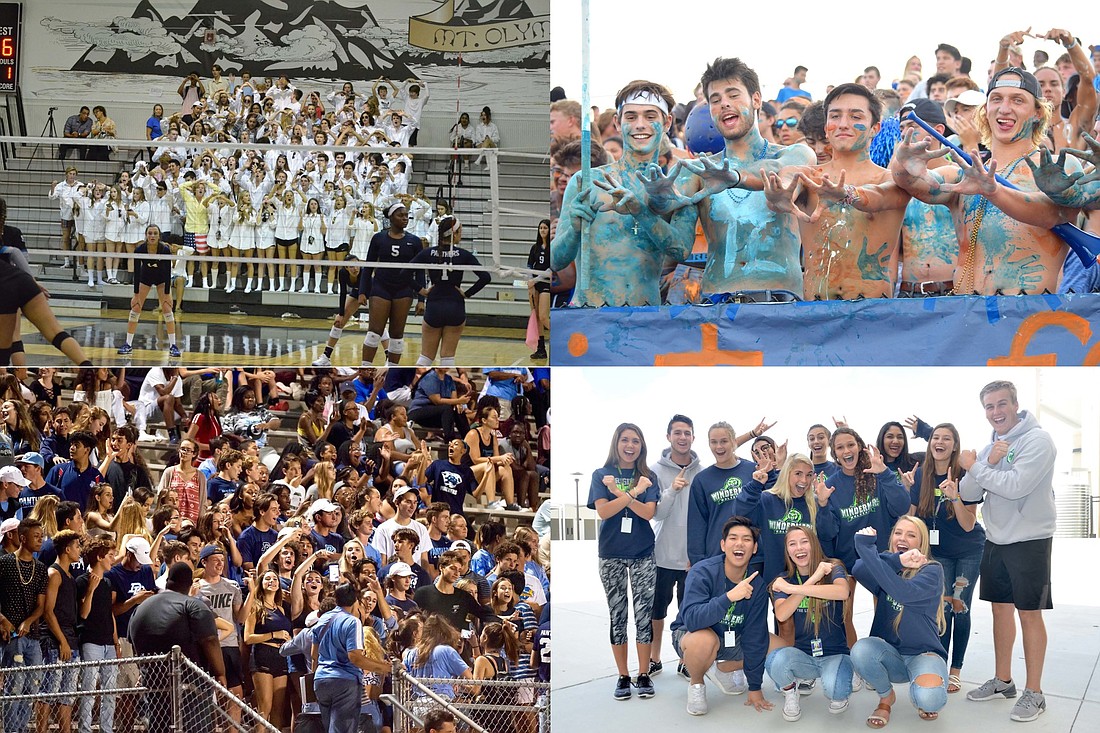- July 26, 2024
-
-
Loading

Loading

Existential question: If a high-school sports game takes place between two rivals and there aren’t dozens of rowdy students going wild, did it really happen?
Well, sure it did — it just wasn’t nearly as fun or memorable as it could have been.
Cheering students have long been a common part of the high-school sports experience, but increasingly, they are organized — whether they are doing so through social media channels, through an official student club through the school, or both.
In West and Southwest Orange County, that manifests itself in the form of well-known chants and hand/arm gestures, coordinated costumes (Hawaiian night, anyone?) and the occasional channeling of LeBron James through his famous “baby powder toss.”
“We’ve had a lot of fun with it,” said Doug Nikhazy, a senior at West Orange High and the president of the school’s 12th Man club.
Other local clubs include Olympia’s “6th Man,” Dr. Phillips’ “Blue Zoo” or “12th Man,” The First Academy’s “Blue Crew” and upstart Windermere High’s “X-Men.”
The benefits for the home team are obvious. Their classmates bring the energy of any game up several notches while also creating an intimidating environment for opponents.
For the students in attendance, too — many of whom tend to be student-athletes on different teams who want to support one another — it can be a unique and exciting way to show some school spirit and get connected.
“I look forward to games — it’s like a reward for working hard all week,” said Grace Gregorie, a senior at West Orange and member of the 12th Man.
Coordinated efforts to support campus teams can be a pretty important factor in creating school pride — it’s why there is already a student section club at the new Windermere High, even before the school has a home stadium.
“I thought it was kind of important to draw everyone together and unite the student body,” said Debbie Siegel, a junior who came to Windermere from Olympia, where she was on the girls lacrosse team and involved in 6th Man.
Similarly, Jonathan Ye came to Windermere from West Orange, where he recalled joining 12th Man as having been an important step in his being active on campus.
“That was a very big part of getting to know the school and getting involved,” Ye said.
To date, the most successful event for the X-Men was the school’s first varsity volleyball game against Olympia, where the student section took on a Hawaiian look as they cheered on their Wolverines.
Although there’s nothing to stop students from labeling themselves with a nickname and operating a part of the school, itself, many of these clubs — such as the ones at West Orange, Windermere and Olympia — see benefits to working with the school and having a faculty sponsor/adviser.
“The way we kind of pushed it was that we can help with funds, you can officially be in the yearbook,” said Lauren Bradley, the faculty adviser for 6th Man at Olympia and the Titans’ former athletic director.
Different clubs handle things such as dues and leadership differently. Olympia has two options for members: an option that includes the club’s T-shirt and a pass to games or an option that just has the T-shirt. At West Orange, the only “dues” are paying for your T-shirt.
One notable positive about these organizations is that they support more than just football — though Friday nights are surely a good place to see a bunch of rowdy students populating a supporter section.
In the fall, volleyball games are a popular destination for these clubs, and their presence makes a difference to the athletes on the court. For someone such as TFA standout Matti McKissock, who also plays high-level club volleyball, there’s something different about a rivalry varsity game from a big-time club matchup.
“High-school games are a lot different, because there is a lot of pressure from your peers on you, watching,” McKissock said. “During club, your friends don’t know if you’ve won a tournament or lost a tournament or if you play or don’t play.”
That pressure can even be a good thing — especially for players who intend to move on to big-time college programs.
“Anybody can play an 8 a.m. travel game in the morning with nobody watching,” said Nikhazy, also a standout for the Warriors baseball team and an Ole Miss commit. “What happens when the lights turn on and everybody is sitting there staring at you … that’s where you see a player’s character.”